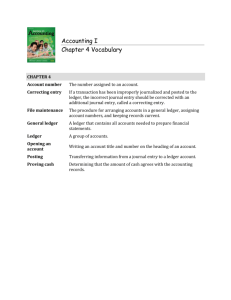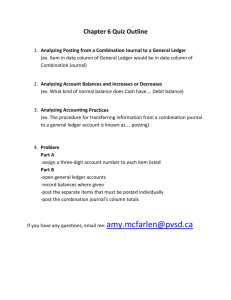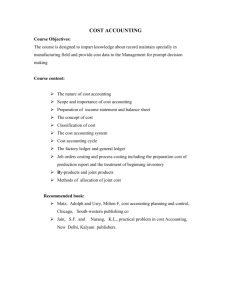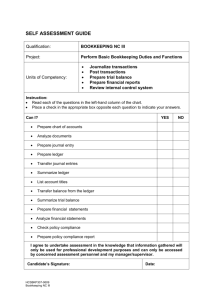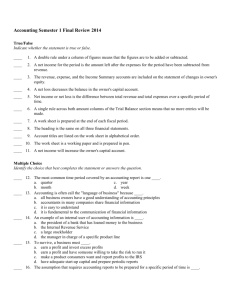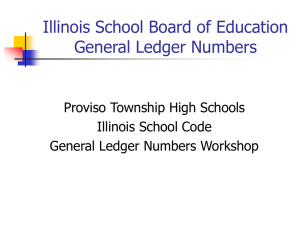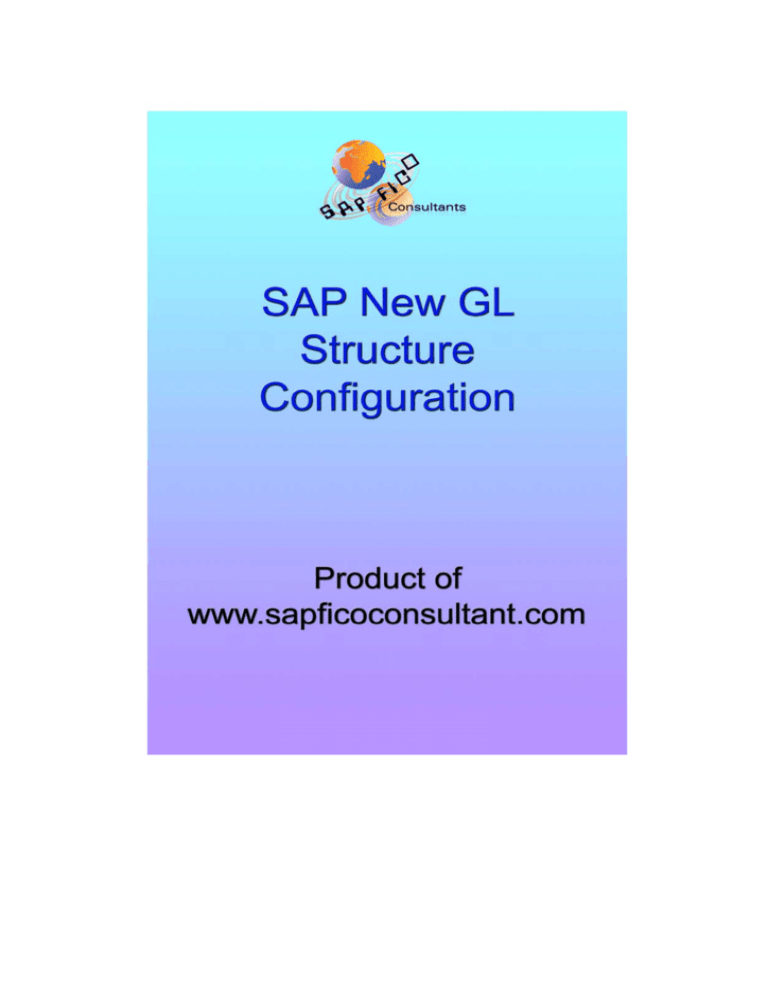
© 2013 sapficoconsultant.com All rights reserved. No part of this material
should be reproduced or transmitted in any form, or by any means, electronic
or mechanical including photocopying, recording or by any information
storage retrieval system without permission in writing from
www.sapficoconsultant.com
“SAP” is a trademark of SAP AG, Neurottstrasse 16, 69190 Walldorf,
Germany.
SAP AG is not the publisher of this material and is not responsible for it under
any aspect.
Warning and Disclaimer
This product is sold as is, without warranty of any kind, either express or implied.
While every precaution has been taken in the preparation of this material,
www.sapficoconsultant.com assumes no responsibility for errors or omissions.
Neither is any liability assumed for damages resulting from the use of the
information or instructions contained herein. It is further stated that the publisher
is not responsible for any damage or loss to your data or your equipment that
results directly or indirectly from your use of this product.
New GL Configuration
Page 2 of 350
www.sapficoconsultant.com
TABLE OF CONTENTS
INTRODUCTION ............................................................................................. 6 1 Creating company code ............................................................................ 8 2 Ledgers (New) ........................................................................................ 13 2.1.1 Ledger ........................................................................................ 13 2.1.1.1 Define Ledgers for General Ledger Accounting ................... 13 2.1.1.2 Define Currencies of Leading Ledger (Optional) ................. 17 2.1.1.3 Define and Activate Non-Leading Ledgers .......................... 21 2.1.1.4 Assign Scenarios and Customer Fields to Ledgers ............. 24 2.1.1.5 Define Ledger Group ........................................................... 29 2.1.1.6 Activate New General Ledger Accounting ........................... 32 2.1.1.7 Maintain Fiscal Year Variant ................................................ 34 2.1.1.8 Assign Company Code to a Fiscal Year Variant .................. 35 2.1.1.9 Define Posting period Variant .............................................. 37 2.1.1.10 Assign Posting period Variant to Company code ................ 38 2.1.1.11 Open and Close Posting Periods ........................................ 40 2.1.2 Parallel Accounting..................................................................... 43 2.1.2.1 Define Accounting Principles ............................................... 43 2.1.2.2 Assign Accounting Principle to Ledger Groups .................... 44 2.1.3 Real-Time Integration of Controlling with Financial Accounting . 45 2.1.3.1 Define Variants for Real-Time Integration ............................ 45 2.1.3.2 Assign Variants for Real-Time Integration to Company Codes
............................................................................................. 47 2.1.3.3 Define Account Determination for Real-Time Integration..... 48 3 Global Parameters for Company Code ................................................... 51 3.1.1 Enter Global Parameters ............................................................ 51 4 Document ............................................................................................... 53 4.1 Documents in Entry View .................................................................. 53 4.1.1 Define Document Number Ranges for Entry View (FBN1) ......... 53 4.1.2 Copy document number ranges to fiscal year (OBH2) ............... 56 4.1.3 Define Document Types for Entry View...................................... 58 4.2 Documents in General Ledger View ................................................. 64 4.2.1 Define Document Number Ranges for General Ledger View
(FAGL_DOCNR) ..................................................................................... 64 4.2.2 Define Document Types for Entry View in a Ledger ................... 69 4.2.3 Define Document Types for General Ledger View ..................... 72 5 Define Field Status Variants ................................................................... 77 6 Assign Company Code to Field Status Variants ..................................... 79 7 Define Tolerance Groups for Employees ................................................ 80 8 Assign Users to Tolerance Groups ......................................................... 84 9 Define Company ..................................................................................... 86 10 Assign company code to company ...................................................... 87 11 Create Chart of accounts .................................................................... 88 12 Assign Company code to Chart of accounts ....................................... 90 13 Define Account Group ......................................................................... 91 14 Define Retained Earnings Account ..................................................... 94 15 Create GL account in Chart of accounts and company code .............. 96 16 Delete G/L Account (OBR2) – (Only for knowledge) ......................... 109 17 Delete Chart of Accounts (OBY8) (Only for knowledge) ................... 111 New GL Configuration
Page 3 of 350
www.sapficoconsultant.com
18 19 Create Additional sort keys ............................................................... 113 Document splitting ............................................................................. 115 19.1.1 Classify G/L Accounts for Document Splitting ....................... 118 19.1.2 Classify Document Types for Document Splitting ................. 122 19.1.3 Define Zero-Balance Clearing Account ................................. 126 19.1.4 Define Document Splitting Characteristics for General Ledger
Accounting .............................................................................. 129 19.1.5 Edit Constants for Nonassigned Processes .......................... 131 19.1.6 Activate Document Splitting .................................................. 133 20 Define Profit Center Standard Hierarchy in Controlling Area............. 135 21 Define Standard Hierarchy ................................................................ 136 22 Specify Time-Dependent Fields for Profit Centers ............................ 144 23 Create Dummy Profit Center ............................................................. 145 24 Define Segment ................................................................................ 146 25 Define Profit Center ........................................................................... 148 26 Assign Default Profit Center to Accounts .......................................... 153 27 Define Plan Periods (For GL planning) ............................................. 154 28 Define Plan Versions (GLPV) ............................................................ 156 29 Assign Plan Version to Fiscal Year and Activate (GLP2) .................. 157 30 Activate Line items for planning (FAGLGCLE) .................................. 158 31 Install Summary table (GLPLINST) (Very Important) ........................ 160 32 Define Planner Profile (GLPLADM) ................................................... 162 33 Define Document Types for Planning Planner Profile (GLPLADM) ... 173 34 Define Number Ranges for Plan Documents (FAGL_PL_LC) ........... 174 35 Allocation........................................................................................... 178 35.1 Define Field Usage for Distribution .............................................. 178 35.2 Define Field Usage for Assessment ............................................ 181 35.3 Create Plan Distribution (FAGLGA47) ......................................... 183 35.4 Create Plan Assessment (FAGLGA27) ....................................... 190 36 Parallel Valuation Approaches/Transfer Prices (Optional) ................ 196 36.1 Basic Settings for Pricing ............................................................. 196 36.2
Define Account Determination for Internal Goods Movements
(Optional) ..................................................................................... 202 36.3 Define Acct Determination for Prod. Variance for Delivery to
Another PrCtr............................................................................... 207 36.4 Define Special Handling for Internal Goods Movements ............. 209 37 Define Translation Ratios for Currency Translation........................... 210 38 Enter Exchange Rates ...................................................................... 213 39 Define Worklist for Exchange Rate Entry .......................................... 214 40 Assign Exchange Rate to the Worklist .............................................. 215 41 DEFINING VALIDATION & SUBSTITUTION .................................... 216 41.1 Define Validations for Posting...................................................... 216 41.2 Define Substitution in Accounting Documents (OBBH) ............... 230 42 TAX SETTINGS SALES / PURCHASE CONFIGURATION .............. 240 42.1 Check Calculation Procedure ...................................................... 240 42.2 Assign Country to Calculation Procedure .................................... 244 42.3 Define Tax Codes for Sales and Purchases (FTXP) ................... 245 42.4 Assign Company Code to Document Date for Tax Determination .....
.................................................................................................... 259 42.5 Specify Base Amount .................................................................. 260 New GL Configuration
Page 4 of 350
www.sapficoconsultant.com
42.6 Define Tax Accounts (OB40) ....................................................... 261 42.7 Assign Tax Codes for Non-Taxable Transactions ....................... 265 43 Configuration for GL Automatic clearing: - ........................................ 266 43.1 Automatic Clearing ...................................................................... 266 43.2 Define Tolerance Groups for G/L Accounts ................................. 267 43.3 Assigning accounts for GL Clearing Differences ......................... 269 44 Configuration for Foreign currency Valuation .................................... 270 44.1 Define Valuation methods ........................................................... 270 44.2 Define Valuation Areas ................................................................ 276 44.3 Check Assignment of Accounting Principle to Ledger Group ...... 277 44.4 Assign Valuation Areas and Accounting Principles ..................... 278 44.5 Prepare Automatic Postings for Foreign Currency Valuation ...... 280 45 Configuration for regrouping postings ............................................... 288 45.1 Define Adjustment Accounts for GR/IR clearing .......................... 288 46 Create Actual Distribution (FAGLGA31) ............................................ 292 47 Create Actual Assessment (FAGLGA27) .......................................... 294 48 Creating Balance sheet and Profit and Loss account ........................ 297 48.1 Define Financial Statement Version (FSV) .................................. 297 49 FI Integration with other modules ...................................................... 318 49.1 Integration with Materials Management ....................................... 318 49.2 Integration with Sales and Distribution ........................................ 342 50 Deactivate Update of Classic General Ledger (GLT0) ...................... 349 51 Set Company Code to Productive ..................................................... 350 New GL Configuration
Page 5 of 350
www.sapficoconsultant.com
INTRODUCTION
This material is applicable for SAP ECC 6 version.
SAP has introduced a new concept called as New GL.
Let us understand this concept of New GL and its use.
Typically in SAP you can depict parallel accounting. Which means you can
carry out valuations and closing operations for a company code according to
local accounting principle and a second accounting principle (parallel) i.e. the
group accounting principle.
Till version 4.7 you could carry out the parallel accounting only by using
additional accounts.
Certain GL accounts are common between 2 the accounting areas.
Certain GL accounts applicable only for local reporting
Certain GL accounts applicable only for group reporting.
The disadvantage of this set up is lots of GL accounts are required and
sometimes reconciliations become difficult.
Financial Statement version (Profit and Loss account, Balance sheet) is also
difficult to set up.
To do away with the above approach SAP has now introduced the New
GL. In this approach parallel accounting is depicted using an additional
ledger.
The data for one accounting principle is stored in the general ledger. This
ledger is known as the Leading ledger or Leading valuation view.
For each additional (parallel) accounting principle, you create an additional
ledger
New GL Configuration
Page 6 of 350
www.sapficoconsultant.com
The advantages of this approach are:1) You do not have to create any additional G/L accounts for multiple
reporting
2) You manage a separate ledger for each accounting principle
3) You can have different fiscal year variants attached to each of the
additional ledger.
4) You can make manual postings to any of the additional ledgers.
5) Reconciliation ledger is no longer needed, since reconciliation
between CO and FI can be carried out real time. So no time consuming
reconciliation.
6) Special purpose ledger is no longer needed
7) Profit center accounting is available within New GL, therefore no
need to activate the Classic Profit center accounting (EC-PCA).Hence
no need of transferring data to Classic profit center accounting and no
reconciliations.
8) New General Ledger uses an extended data structure as standard.
You can also add customer fields to total table in GL.
9) By splitting documents in real time you can prepare financial
statements for entities such as segments and profit centers.
Configuration Scenario:
A Grp of companies (Parent company) is a multinational company with
companies across the world with base in Germany. The company has
decided to implement SAP for its subsidiary G Ltd located in India. A Grp of
companies have to use the common chart of accounts. The currency in India
is INR. The Parent company wants the accounts to be prepared based on
Calendar year January to December. The financial reporting should be in
EURO.
G Ltd has a local reporting requirement under the companies act
G Ltd also has a tax requirement to prepare it Accounts based on accounting
period April to March.
Based on the above requirements we need to configure the following using
the New GL:Create company code 9101 – G Ltd.
The company code currency– INR
Parallel currencies to be implemented – EURO
Common chart of accounts – YCCA
Ledger 0L (leading valuation view) reporting period – Jan to December for
group reporting
Ledger Y1 (additional ledger) for local reporting under the companies act.
Ledger Y2 (additional ledger) for local tax reporting period (April to
March)
New GL Configuration
Page 7 of 350
www.sapficoconsultant.com
1
Creating company code
Company code is the basic organizational unit in FI (Financial accounting) for
which a balance sheet and profit & loss account can be drawn. We create
company code 9101 (G Ltd.) which is located in country India.
For doing the configuration we use the following path on the SAP application
screen:SAP Menu Tools Customizing IMG SPRO - Execute Project
Configuration for all the modules will be done here. The above path will
not be referred henceforth; we will directly refer to the IMG node.
SAP Customizing Implementation Guide Enterprise Structure Definition
Financial Accounting Edit, Copy, Delete, Check Company Code
Double click on Edit Company Code
New GL Configuration
Page 8 of 350
www.sapficoconsultant.com
By selecting the second option Edit Company Code data you have to
manually configure all the subsequent assignments.
By selecting the first option all the configuration and tables get copied
automatically along with assignments. This option should be selected in case
of rollouts.
In the Copy option you need to click on
to copy a company code from an
existing company code. You can copy from existing company code delivered
by SAP.
You can select a four-character alpha-numeric key as the company code key.
This key identifies the company code and must be entered when posting
business transactions or creating company code-specific master data, for
example.
We will cover the FI configuration from scratch and not copying
configuration from an existing company code.
New GL Configuration
Page 9 of 350
www.sapficoconsultant.com
New GL Configuration
Page 10 of 350
www.sapficoconsultant.com
Click on
and update the following fields:
The company code should be always kept numeric.
Country: The country where company code is located and the balance sheet
and income statement which will be prepared according to that country law.
Here the company is located in India so, we have selected the country id IN
(INDIA).
Currency: It is the local reporting currency of the country. In this case it is INR
(Indian rupees) since the company is located in India.
Click on Address
and update the following fields
New GL Configuration
Page 11 of 350
www.sapficoconsultant.com
Click
Click
to save entry.
Thus company code 9101 is created in SAP.
New GL Configuration
Page 12 of 350
www.sapficoconsultant.com
2
Ledgers (New)
2.1.1 Ledger
2.1.1.1 Define Ledgers for General Ledger Accounting
You define the ledgers that you use in General Ledger Accounting. The
ledgers are based on a totals table. SAP recommends using the delivered
standard totals table FAGLFLEXT.
The following types of ledgers are available:
Leading Ledger:
The leading ledger is based on the same accounting principle as that of the
consolidated financial statement. It is integrated with all subsidiary ledgers
and is updated in all company codes. You must designate one ledger as
the leading ledger.
In each company code, the leading ledger automatically receives the settings
that apply to that company code: the currencies, the fiscal year variant, and
the variant of the posting periods.
In our scenario the group reporting is handled by the Leading Ledger.
Non-Leading Ledger:
The non-leading ledgers are parallel ledgers to the leading ledger. They can
be based for example on local accounting principles
You must activate a non-leading ledger by company code.
For each ledger that you create, a ledger group of the same name is
automatically created.
In our scenario the local reporting is handled by the Non- leading ledger.
New GL Configuration
Page 13 of 350
www.sapficoconsultant.com
IMG Financial Accounting (New) Financial Accounting Global Settings
(New) Ledgers Ledger Define Ledgers for General Ledger
Accounting
0L is the Leading Ledger.
Click on
Update the following:-
Click on
New GL Configuration
Page 14 of 350
www.sapficoconsultant.com
Click
New GL Configuration
Page 15 of 350
www.sapficoconsultant.com
Click
New GL Configuration
Page 16 of 350
www.sapficoconsultant.com
2.1.1.2 Define Currencies of Leading Ledger (Optional)
IMG Financial Accounting (New) Financial Accounting Global Settings
(New) Ledgers Ledger Define Currencies of Leading Ledger
This configuration is only required when you want to activate additional
currencies for your leading ledger.
Here you specify the currencies to be applied in the leading ledger. You can
make the following settings for each company code.
The group currency must be stored in the client definition which can be seen
using transaction code SCC4
Here we can select valuation 1 & 2 only if the following conditions are
met:1) Controlling area has been assigned to the company code
2) A currency and valuation profile is defined in the controlling area
3) The currency and valuation profile is active which has the group
and profit center valuation view
Come back and do this configuration after the controlling area has been
assigned to the company code
You can instead of 1 and 2 also select 0 legal valuation.
Click on
New GL Configuration
Page 17 of 350
www.sapficoconsultant.com
Update the following:-
Click
New GL Configuration
Page 18 of 350
www.sapficoconsultant.com
New GL Configuration
Page 19 of 350
www.sapficoconsultant.com
Now update the following:-
Click on
New GL Configuration
Page 20 of 350
www.sapficoconsultant.com
2.1.1.3
Define and Activate Non-Leading Ledgers
IMG Financial Accounting (New) Financial Accounting Global Settings
(New) Ledgers Ledger Define and Activate Non-Leading Ledgers
Here you make the following settings for the non-leading ledgers for each
company code:
You activate the non-leading ledgers in the company code.
You can define additional currencies beyond that of the leading ledger.
The first currency of a non-leading ledger is always the currency of the
leading ledger (and hence that of the company code). For the second
and third currencies of a non-leading ledger, you can only use currency
types that you have specified for the leading ledger.
You can define a fiscal year variant that differs from that of the leading
ledger. If you do not enter a fiscal year variant, the fiscal year variant of
the company code is used automatically.
You can specify a variant of the posting periods.
Update the following:-
New GL Configuration
Page 21 of 350
www.sapficoconsultant.com
Click on
Update the following:-
Click on
Click
Now update the following:-
New GL Configuration
Page 22 of 350
www.sapficoconsultant.com
Click on
Update the following:-
Take a drop down in the field FV (Fiscal year variant)
You can even assign a different posting period variant to this ledger
New GL Configuration
Page 23 of 350
www.sapficoconsultant.com
Click on
2.1.1.4
Assign Scenarios and Customer Fields to Ledgers
IMG Financial Accounting (New) Financial Accounting Global Settings
(New) Ledgers Ledger Assign Scenarios and Customer Fields to
Ledgers
In this IMG activity, you assign the following to your ledgers:
Scenarios
This determines what fields in a ledger are updated when it receives posting
from other application components. It is not possible to create any new
scenarios other then predefined scenarios.
Custom Fields
You can add custom fields (that you have already defined) to the ledger.
Versions
This enables you to make general version settings for the ledger that depend
on the fiscal year. In the versions, you specify whether actual data is
recorded, whether manual planning is allowed, and whether planning
integration with Controlling is activated.
New GL Configuration
Page 24 of 350
www.sapficoconsultant.com
Select
Click
New GL Configuration
Page 25 of 350
www.sapficoconsultant.com
Click
New GL Configuration
Page 26 of 350
www.sapficoconsultant.com
Click
Click on
Click on
Click
New GL Configuration
Page 27 of 350
www.sapficoconsultant.com
Click
Select
Click
Click on
Update the following:-
Click on
New GL Configuration
Page 28 of 350
www.sapficoconsultant.com
To assign Profit center update you need to have profit center module active.
Click
Select
Click
Click on
Update the following:-
Click on
2.1.1.5
Define Ledger Group
IMG Financial Accounting (New) Financial Accounting Global Settings
(New) Ledgers Ledger Define Ledger Group
Here you define ledger groups. A ledger group is a combination of ledgers for
the purpose of applying the functions and processes of general ledger
accounting to the group as a whole.
New GL Configuration
Page 29 of 350
www.sapficoconsultant.com
When posting, for example, you can restrict the update of individual postings
to a ledger group so that the system only posts to the ledgers in that group.
You can combine any number of ledgers in a ledger group. In this way, you
simplify the tasks in the individual functions of General Ledger Accounting.
When a ledger is created, the system automatically generates a ledger group
with the same name. In this way, you can also post data to an individual
ledger or access it when using functions where you can only enter a ledger
group and not ledgers.
You can change the name of the ledger group that was taken from the ledger.
You only have to create those ledger groups in which you want to combine
several ledgers for joint processing in a function.
You do not need to create a ledger group for all ledgers because the
system automatically posts to all ledgers when you do not enter a ledger
group in a function.
Representative Ledger of a Ledger Group
The system uses the representative ledger of a ledger group to determine the
posting period and to check whether the posting period is open. If the posting
period for the representative ledger is open, the system posts in all ledgers of
the group, even if the posting period of the non-representative ledgers is
closed. Each ledger group must have exactly one representative ledger:
If the ledger group has a leading ledger, the leading ledger must always be
identified as the representative ledger.
If the ledger group does not have a leading ledger, you must designate one of
the ledgers as the representative ledger. If the ledger group has only one
ledger, this ledger is then the representative ledger. If the ledger group has
more than one ledger, the system checks during posting whether the
representative ledger was selected correctly. This check is based on the fiscal
year variant of the company code:
We do not want to group the ledgers, therefore we do not do any
configuration here.
New GL Configuration
Page 30 of 350
www.sapficoconsultant.com
Select
Double click
New GL Configuration
Page 31 of 350
www.sapficoconsultant.com
Select Y1
Double click
Similarly you can check Y2
2.1.1.6 Activate New General Ledger Accounting
IMG Financial Accounting Financial Accounting Global Settings
Activate New General Ledger Accounting (FAGL_ACTIVATION)
By activating New General Ledger Accounting, you achieve the following:
1) The functions for new General Ledger Accounting become available.
2) In the SAP Reference IMG, the previous Financial Accounting menu is
replaced by the Financial Accounting (New) menu. Under Financial
Accounting Global Settings (New) and General Ledger (New), you can
make the settings for New General Ledger Accounting.
3) You activate the tables of new General Ledger Accounting so that your
posting data is written to them.
If you already use classic General Ledger Accounting in your production
system, you need to perform the migration of this data before you activate
New GL Configuration
Page 32 of 350
www.sapficoconsultant.com

